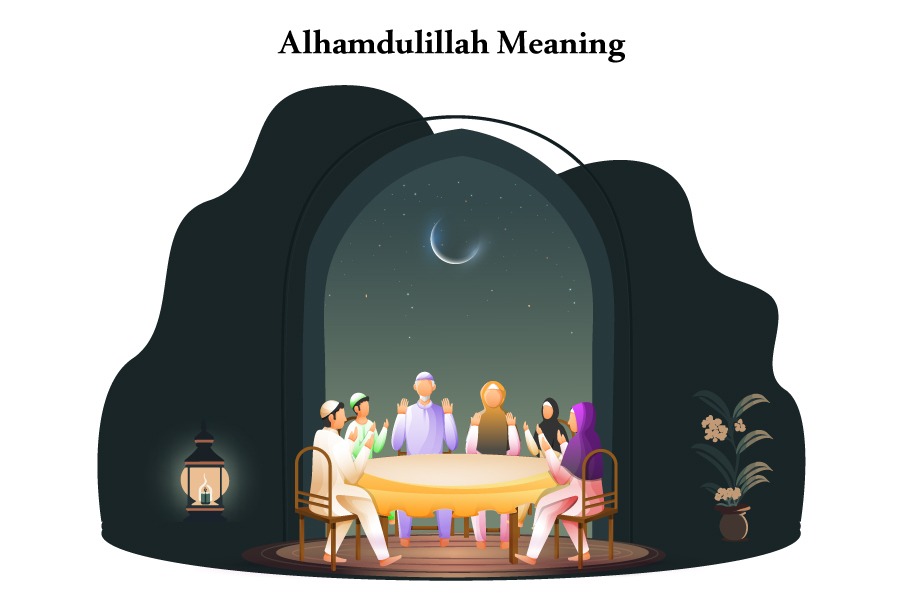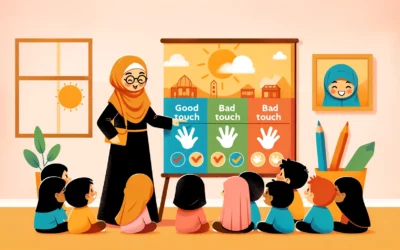What is Alhamdulillah?
The Arabic phrase ‘Alhamdulillah’ has echoed across cultures and communities, often heard whispered in moments of joy, relief, or reflection. So, what is the ‘Alhamdulillah’ meaning that makes it such an integral part of the lives of millions? Let’s dive into Alhamdulillah meaning and its significance.
What is Alhamdulillah Meaning?
At its core, ‘Alhamdulillah’ translates to “All praise is due to Allah.” For Muslims, articulating this phrase is a cornerstone of their faith, an expression deeply ingrained in both the teachings of the Quran and the Sunnah of Prophet Muhammad (saws).
Dive into any daily prayer or salah, and one finds oneself greeted with “Alhamdulillahi Rabbil ‘aalameen”, which means [All] praise is [due] to Allah, Lord of the worlds. This is a testimony to the emphasis placed on this phrase.
In its written form in Arabic, ‘Alhamdulillah’ appears as ٱلْحَمْدُ لِلّٰهِ. Decomposing this, we have:
- al: The definite article that translates to “the.”
- hamdu: Signifying “praise.”
- li-llah: A preposition and the noun Allah combined, meaning “to Allah.”
Join these elements, and ‘Alhamdulillah’ comes alive as “All Praise To Allah” or “Praise and thanks be to Allah”.
Transliteration of Alhamdulilah:
The varied transliterations of ‘Alhamdulillah’ that we often find in written form – from Hamdullah and Hamdulillah to Al-hamdu lil-lah – are efforts to guide non-native speakers towards the word’s accurate pronunciation. Most commonly, one would find ‘Alhamdulillah’ or ‘Al-hamdulillah’ used, capturing the word’s true essence.
The beauty of ‘Alhamdulillah’ isn’t just in its phonetic resonance but in its versatile application. From moments of reflection (dhikr) to times of joy, triumph, or even distress, whispering ‘Alhamdulillah’ is a reminder of the divine, a moment of grounding in gratitude.
When to Use Alhamdulillah: Some References from Hadith as per Alhamdulliah Meaning
While there are numerous hadiths and verses from the Quran that emphasize the importance of gratitude and thankfulness to Allah, below are some of the hadiths that shed light on the significance of “Alhamdulillah”:
Saying “Alhamdulillah” after eating: Narrated Mu’adh ibn Anas: The Prophet (ﷺ) said, “Whoever has taken a meal and says at the end of it, ‘Alhamdulillahil-ladhi at’amani hadha warazaqanihi min ghairi haulin minni wa la quwwatin,’ (Praise be to Allah Who has fed me this food and provided it for me, without any strength or power on my part) all his past sins will be forgiven.” [Narrated by Ibn Majah]
Saying Alhamdulilah after Sneezing:
One of the well-known Hadiths regarding saying “Alhamdulillah” after sneezing is as follows:
Narrated by Abu Huraira (may Allah be pleased with him), the Prophet Muhammad (peace be upon him) said: “When one of you sneezes, let him say, ‘Alhamdulillah’ (Praise be to Allah), and let his brother or companion say to him, ‘Yarhamukallah’ (May Allah have mercy on you). If he says ‘Yarhamukallah,’ then let [the sneezer] say, ‘Yahdikumullah wa yuslihu balakum’ (May Allah guide you and rectify your condition).” (Sahih al-Bukhari)
This Hadith emphasizes the importance of saying “Alhamdulillah” (Praise be to Allah) after sneezing as an expression of gratitude to Allah. It also highlights the etiquettes of responding to a sneezer by saying “Yarhamukallah” (May Allah have mercy on you), and the sneezer responding with a prayer for guidance and rectification.
Expressing Gratitude: Muslims say “Alhamdulillah” to express gratitude to Allah for the blessings in their lives, whether for good health, provision, a successful accomplishment, or any other favor. During Prayer (Salat): “Alhamdulillah” is a part of Surah Al-Fatiha, the opening chapter of the Quran, recited during the five daily obligatory prayers. It is a fundamental component of Muslim prayer.
Upon Hearing Good News: When you receive good news or witness something positive happening, you should say “Alhamdulillah” to acknowledge that it is a blessing from Allah.
At the End of the Day: Make it a practice to reflect at the end of the day and say “Alhamdulillah” before going to sleep, thanking Allah for the day’s experiences while feeling true Alhamdulillah meaning
When Receiving a Compliment: When someone compliments you, you should respond with “Alhamdulillah” to acknowledge that your qualities or achievements are ultimately gifts from Allah.
When Witnessing a Beautiful Scene: In the presence of natural beauty, such as a picturesque landscape, You should say “Alhamdulillah” to appreciate the beauty of Allah’s creation.
The Power of Alhamdulillah Meaning:
Acknowledgment of Divine Grace: When someone says “Alhamdulillah,” they are essentially acknowledging Allah’s grace and blessings in their life. Alhamdulillah meaning reminds them that everything they have, including their talents, opportunities, and possessions, is a result of Allah’s benevolence. Such awareness naturally encourages humility.
Counteracting Arrogance: In contrast to arrogance, which is characterized by an inflated sense of self-importance, saying “Alhamdulillah” acts as a counterbalance. It reminds individuals that their achievements and successes are not solely their own doing but are part of Allah’s plan. This knowledge prevents them from becoming conceited or egotistical.
Gratitude as a Humble Virtue: Alhamdulillah meaning is a manifestation of gratitude, which is considered a virtuous and humble quality. Grateful individuals are more likely to acknowledge their reliance on Allah and the contributions of others. This humility stems from an appreciation of the interconnectedness of all beings.
Awareness of One’s Place: When people express gratitude through “Alhamdulillah,” they are inherently aware of their place in the grander scheme of things. This awareness keeps them grounded as they recognize they are part of a broader universe governed by Allah’s divine plan. This sense of belonging fosters humility.
Humility in Adversity: “Alhamdulillah” is not limited to expressing thanks for good times; it is equally valuable in times of difficulty. When individuals say “Alhamdulillah” during challenging moments, they acknowledge that Allah’s wisdom surpasses their own understanding. This surrender to a higher power reflects humility in the face of adversity.
Respect for Others: Humility is also about showing respect and empathy towards others. Alhamdulillah meaning acknowledge the role of Allah in both their successes and the successes of others. This recognition prevents them from looking down on others and encourages them to treat everyone with respect and kindness.
Lifelong Learning: Humble individuals are often open to learning and self-improvement. By saying “Alhamdulillah,” individuals recognize that they are constantly evolving and that there is always room for growth. Alhamdulillah meaning sets the attitude of continuous self-improvement which is a key aspect of humility.
How to Use Alhamdulillah in Daily Life:
- “Feeling grateful for the supportive partner I have. Alhamdulillah.”
- “Alhamdulillah, for another day of opportunities and lessons.”
- “Got a promotion at work today. Alhamdulillah for this unexpected blessing!”
- “Traveling always makes me realize the vastness of the world and the beauty of my faith. Alhamdulillah for Islam.”
‘Alhamdulillah’ is not just a word – it’s a life philosophy. It encapsulates humility, gratitude, and a profound awareness of the divine. As life unfolds with its mix of highs and lows, the Alhamdulillah meaning serves as a compass, guiding the heart towards gratitude and acceptance.
In the wisdom of Surah Baqarah, verse 155, it is said: “And We will surely test you with something of fear and hunger and a loss of wealth and lives and fruits, but give good tidings to the patient.” This emphasizes the transient nature of life and the importance of patience, resilience, and gratitude, all wrapped in the spirit of ‘Alhamdulillah.’
So, the next time you hear or recite ‘Alhamdulillah,’ remember it’s more than a word. Alhamdulillah meaning is an embrace of life with all its twists and turns, a declaration of faith, and a testament to boundless gratitude.

















